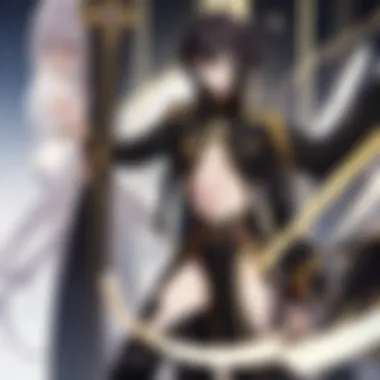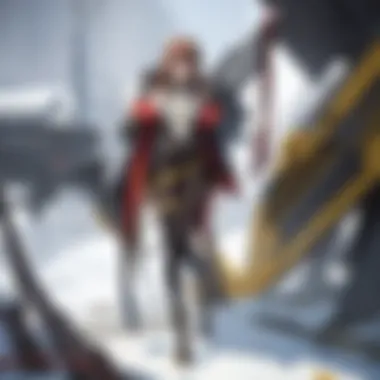Code Geass Season 1: An In-Depth Analysis of Power and Rebellion


Intro
Code Geass Season 1 serves as an ambitious introduction to a world fraught with political strife, character ambitions, and philosophical inquiries about power and morality.
The series quickly establishes itself as more than just a visual spectacle. It raises significant questions about governance, personal freedoms, and the ethics of rebellion. The protagonist, Lelouch Lamperouge, is a character that embodies the struggle between tragic decisions and the quest for justice. Through his journey and the choices he makes, the narrative explores the multifaceted nature of human ambition and the impact it can have on society as a whole.
In this analysis, we will delve into the character profiles, theme exploration, and ultimately the cultural significance of Code Geass. With its unique narrative style and complex characters, the show appeals to both casual viewers and those searching for deeper meaning within anime.
Character Profiles
Overview of Main Characters
The character development in Code Geass is remarkable. Each character plays a vital role in supporting the narrative and enhancing thematic elements. Lelouch Lamperouge, the anti-hero with a brilliant tactical mind, is perhaps the most prominent character. He possesses the power of Geass, allowing him to compel others to act according to his will. This ability raises questions about authority, manipulation, and the consequences of wielding such power.
In contrast, Suzaku Kururugi, a childhood friend of Lelouch, represents loyalty and ethics, often standing against Lelouch's morally ambiguous decisions. Their conflicting ideologies drive a significant portion of the plot.
Moreover, CC is another key figure. She grants Lelouch Geass and is shrouded in mystery. Her backstory deepens the philosophical inquiries within the series, especially related to immortality and the purpose of one's existence.
Supporting Characters
Supporting characters also enrich the storyline. Kallen Stadtfeld embodies the rebellious spirit, fighting against the oppressive regime of the Britannian Empire. Her struggles with identity and loyalty contribute to the series' exploration of rebellion and resistance.
Additionally, Cornelia li Britannia stands as an imposing antagonist. Her strategic mind and fierce determination present a formidable challenge to Lelouch’s plans. The interplay between these characters not only enhances the narrative but also serves to highlight the show's themes of power and sacrifice.
Theme Exploration
Central Themes
Code Geass embodies various themes that resonate with the audience. The struggle for power is a central theme, seen in the battles for dominance between characters and nations. However, the series does not portray power simply as a tool for oppression; it also critiques the responsibilities that come with such control.
Another significant theme is the moral ambiguity of war. Through Lelouch’s actions, the series raises essential questions about justification for violence. Is it acceptable if it serves a greater good? This question lingers throughout the series, often complicating the viewer's perception of heroism.
Cultural References
Culturally, Code Geass incorporates references that enrich the viewer’s understanding. Elements of Japanese history and political structures appear within the fictional world. The relationships between characters often reflect societal hierarchies and class struggles prevalent in Japan’s past and present.
"Code Geass is a study of rebellion, and understanding one’s position in a world that often feels controlled by unseen forces."
The backdrop of a devastating military regime parallels various historical events, further anchoring the series in reality while blending it with fictional elements.
Popular Series and Recommendations
Top Anime Series of the Year
Anime enthusiasts often look for recommendations to expand their viewing portfolio. Some popular series of the year that have gained acclaim include:
- Attack on Titan
- Jujutsu Kaisen
- My Hero Academia
Each of these series shares thematic depth and character complexity reminiscent of Code Geass, making them worthwhile for any anime fan.
Hidden Gems in Manga
For those exploring manga, several hidden gems deserve attention:
- Vinland Saga
- Mushoku Tensei
- Oshi no Ko
These titles, while not as widely recognized, offer intricate plots and character relationships that echo the compelling storytelling found in Code Geass.


Through this article, the aim is to provide a rich understanding of Code Geass Season 1. It's a series that challenges moral understandings, critiques power dynamics, and reflects cultural issues, all wrapped in a compelling narrative suitable for any anime enthusiast.
Prelude to Code Geass
The introduction to Code Geass lays a critical foundation for understanding its multifaceted narrative and complex themes. This section serves as a gateway, guiding readers through the essence of the series while contextualizing its significance within the broader realm of anime. Approaching the in-depth analysis demands a grasp of the initial groundwork, which reinforces why Code Geass has garnered both admiration and critical appraisal over the years.
Overview of the Series
Code Geass is a thought-provoking anime that first aired in 2006, created by the collaboration between Sunrise, renowned for its mecha productions, and the acclaimed director Gorō Taniguchi. Set in an alternate reality where the Holy Britannian Empire has conquered Japan, the series introduces viewers to a world marked by oppression, rebellion, and the pursuit of justice.
The protagonist, Lelouch vi Britannia, serves as a central figure whose intricate motivations and philosophical dilemmas drive the plot. With his discovery of a supernatural power known as "Geass," Lelouch embarks on a path to overthrow the Britannian regime, leading to strategic confrontations and moral quandaries. The series skilfully blends elements of political drama, action, and psychological conflict, engaging the audience on multiple levels.
Initial Reception and Impact
Upon its release, Code Geass received an overwhelmingly positive response. Critics praised its ambitious storytelling, well-developed characters, and often surprising plot twists. Many highlighted the intelligent examination of power structures and ethical dilemmas—themes that resonate deeply with both Japanese culture and global audiences.
"Code Geass confronts the viewer with uncomfortable questions about morality and justice, making it a profound commentary on power dynamics that transcends the typical boundaries of anime."
The impact of Code Geass extends beyond its immediate viewership; it has inspired a resurgence of interest in intelligent narratives within anime. The series has influenced numerous works and has become a benchmark for future stories that explore similar themes, reinforcing its status as a cultural phenomenon. Critical discussions and analyses of its complex character relationships and ethical challenges continue to thrive in various forums, contributing to its lasting legacy in the genre.
Plot Synopsis of Season
The narrative of Season 1 of Code Geass unfurls in a meticulously crafted universe that combines elements of science fiction, political intrigue, and complex moral questions. This section explores both the setting and context as well as the main arc overview to provide a coherent understanding of the series' foundation and trajectory.
Setting and Context
Set in an alternate timeline, Code Geass portrays a world where the Holy Britannian Empire has subjugated Japan, renaming it Area 11. The oppressive rule of Britannia creates a palpable tension that drives the story. The technological advancements juxtaposed against the human struggles depict a society rife with conflict.
This backdrop is critical because it highlights the clash of ideologies between the Empire and the Japanese resistance. As viewers delve into this context, they witness the systemic issues of power and authority, which echo throughout the narrative. It also lays the groundwork for character motivations, particularly that of Lelouch vi Britannia, a key figure seeking to dismantle the empire's oppressive regime.
Understanding the setting is essential, as it influences character interactions and decisions. The dystopian nature of this world serves as a commentary on real-world struggles against tyranny and the quest for freedom.
Main Arc Overview
The primary arc of Season 1 revolves around Lelouch’s transformation from a disillusioned prince to a revolutionary leader. After acquiring the Geass ability—a power that allows him to command anyone to obey his orders—Lelouch takes on the persona of "Zero". This alter ego is essential to his quest for revenge against Britannia for the suffering of his sister and his mother.
Key plot points include:
- Formation of the Black Knights: Lelouch establishes a group committed to overthrowing Britannia, uniting various factions of society.
- Conflict with Powerhouses: The arc illustrates Lelouch's encounters with pivotal characters, including Suzaku Kururugi, who represents the opposing ideology of seeking change from within the system.
- Strategic Manipulations: Lelouch's strategic mind is showcased as he orchestrates battles, pitting different factions against each other, thus emphasizing his role as a master manipulator.
The first season intricately weaves these elements into a greater narrative that not only entertains but also provokes thought about the nature of power, authority, and the morality of one's actions in pursuit of a greater good. This complexity makes Code Geass a standout in the anime genre, capturing the attention of both fans and critics alike.
Character Analysis
The character analysis segment is pivotal to understanding the complexities presented in Code Geass. Each character molds the narrative, presenting various themes and emotional responses that reflect broader societal values. Dissecting characters allows viewers to see motivations and moral dilemmas, creating a richer engagement with the series. This analysis provides clarity on how individual choices shape larger societal repercussions. It’s essential to explore significant characters like Lelouch, Suzaku, and C.C., among others. The interplay between these characters reveals the intricacies of authority, rebellion, and personal identity, making it a compelling aspect of the anime.
Lelouch vi Britannia
Lelouch vi Britannia serves as the central figure in Code Geass. His transformation from a prince to a revolutionary leader defines the series. Motivated by a desire for revenge against his father, Lelouch embodies the conflict between personal ambition and ethical responsibility. The use of the Geass power gives him the ability to compel obedience, raising questions about free will and morality. His strategic mind reveals a leader's burden, often manipulative but justified in his pursuit of justice.
Lelouch's character grapples with profound themes of sacrifice, love, and the cost of achieving one’s goals. His relationships, particularly with his sister Nunnally and rival Suzaku, further complicate his motives and decisions. Lelouch's internal conflicts resonate with the audience, making him a character of great depth.
Suzaku Kururugi
Suzaku Kururugi stands in contrast to Lelouch. As a childhood friend, his values often oppose Lelouch’s ends-justifies-the-means approach. Suzaku’s commitment to justice and his belief in reform rather than rebellion make him a foil to Lelouch. His character represents themes of honor and accountability, often placing him at odds with his friend.
Throughout Season 1, Suzaku’s journey is marked by personal struggle. Being a soldier for the oppressive Britannian regime embodies the challenge of fighting against systemic corruption from within. His decisions lead to tensions with Lelouch, highlighting the differing philosophies regarding change and morality. Through Suzaku, the narrative explores the complexities of loyalty and the burden of choice in a world rife with conflict.


C.C.
C.C. is another integral character in Code Geass. As the one who grants Lelouch the Geass, her motivations initially seem obscure. Her background as an immortal being provides a dark contrast to Lelouch's quest for power. C.C. is enigmatic, often expressing indifference to human emotions, yet her character develops significantly throughout the series.
Her relationship with Lelouch deepens as they share burdens of knowledge and power. C.C. embodies the theme of isolation, as her immortality distances her from humanity. Her insights into life, death, and the choices people make add philosophical layers to the narrative, pushing viewers to contemplate deeper moral questions.
Supporting Characters
Supporting characters enrich the narrative of Code Geass, offering various perspectives on the central themes. Characters like Nunnally, Kallen, and Jeremiah Gottwald play essential roles in shaping the story’s trajectory.
- Nunnally Lamperouge: Represents innocence and serves as Lelouch's motivation. Her blindness and disability evoke significant sympathy, keeping the audience invested in Lelouch's goals.
- Kallen Stadtfeld: A key figure in the resistance, Kallen showcases the passion and drive of rebellion. Her dual identity reflects the struggle between societal roles and personal beliefs.
- Jeremiah Gottwald: A complex antagonist whose motives and loyalty oscillate serve to emphasize themes of redemption and conflict.
Through these characters, Code Geass delves into the broader notions of loyalty, conflict, and the personal costs associated with war. Each character’s narrative arc contributes to understanding the series’ themes, making their analysis critical for an appreciative view of the show.
Themes and Motifs
In Code Geass, themes and motifs play a crucial role in understanding the layered narrative. By looking closely at these elements, we can reveal the intricate world the characters inhabit and the moral dilemmas they face. This analysis not only helps in deciphering the plot but also enriches the viewer's appreciation of the anime as a whole. In exploring power and authority, rebellion and resistance, and identity and morality, viewers can connect more deeply with the character arcs and overarching story.
Power and Authority
The exploration of power and authority is central to Code Geass. The conflict between the Holy Britannian Empire and the Japanese rebels illustrates this theme vividly. Power dynamics dictate not only political decisions but also interpersonal relationships among characters. Lelouch vi Britannia, the protagonist, wields the Geass, a supernatural power that allows him to command others, further complicating questions about moral power.
Through his actions, the series poses significant questions: What is the true nature of authority? Does the end justify the means? Lelouch’s journey reflects his struggle with these questions as he attempts to achieve his goals. The authority he exerts often brings unintended consequences, leading him to confront ethical dilemmas about manipulation and autonomy. This theme resonates with the historical context of colonialism and imperialism, inviting viewers to reflect on the nature of oppression.
Rebellion and Resistance
Rebellion is a recurring motif throughout Code Geass, encapsulating the spirit of those who seek to overthrow oppressive regimes. The members of the Black Knights represent radical resistance, contrasting against those who conform to the status quo. Suzaku Kururugi, a notable character, embodies this internal conflict as he believes in reforming the system from within, rather than tearing it down.
The duality of rebellion and resistance creates a rich narrative tension. This tension raises questions such as: What does it mean to fight for freedom? Are violent revolutions justified? The characters’ varied motivations highlight the complexity of their choices. By challenging authority, they risk their lives, but also must grapple with the morality of their methods. This leads to a broader commentary on the nature of revolution, history, and the sacrifices required for societal change.
Identity and Morality
Identity and morality intersect deeply within the characters of Code Geass, making it an essential theme. Lelouch’s dual life as a prince and a rebel complicates his sense of self. As he adopts the persona of Zero, he grapples with what it means to be a hero or a villain. His moral compass is constantly tested, resulting in a complex depiction of identity shaped by choices and consequences.
Other characters also navigate their own moral landscapes. C.C., for instance, represents the cost of immortality, revealing layers of identity tied to past choices and regrets. The series thoughtfully examines the gray areas that exist in moral decisions, encouraging viewers to question where they might draw the line in similar situations.
Art and Animation Style
In the realm of anime, art and animation style plays a crucial role in conveying emotions, setting the tone, and enhancing storytelling. Code Geass is no exception. The series employs a unique visual style that captivates its audience while complementing the complex narrative and character arcs. Distinct choices in character design and visual aesthetics help to create an engaging experience for viewers.
Character Design
Character design in Code Geass is particularly notable. The sharp lines and exaggerated features convey a lot about each character's personality. Lelouch, for instance, is introduced with distinctive black hair and piercing eyes. His design reflects his tactical and enigmatic nature. In contrast, Suzaku, with softer features and lighter colors, embodies a more idealistic approach to his struggles.
The range of designs also includes C.C., whose mysterious aura is enhanced by her unconventional look. Each character's design serves as a tool to express their traits and backgrounds effectively. This visual distinction allows audiences to quickly grasp character identities, making the viewing experience more intuitive.
Visual Aesthetics
The overall visual aesthetics of Code Geass also contribute significantly to its impact. The use of color is deliberate and symbolic. Warmer tones often accompany scenes of camaraderie and hope, whereas cooler hues are prevalent during moments of tension and conflict. This strategic color palette enhances emotional depth, guiding viewers’ emotional responses throughout the plot.
Furthermore, the animation quality remains consistently high, seamlessly blending action scenes with quiet, character-driven moments. The fluidity of motion, particularly during mecha battles, showcases the technological prowess of the studio. It keeps the viewer engaged and invested in the outcome of the conflicts.
"In Code Geass, the art serves not just as a backdrop, but also as a narrative device itself."
Overall, the art and animation style of Code Geass is more than mere visuals; it is a fundamental part of storytelling that enhances character development and thematic expression.Through effective character design and visual aesthetics, the series creates an immersive experience that resonates strongly with its audience.
Cultural References


The concept of cultural references in Code Geass Season 1 is pivotal to understanding its depth and appeal. These references enrich the narrative and connect it to broader societal issues. Viewers, especially anime and manga enthusiasts, can relate to the thematic arcs presented in the series. The integration of real-world historical events and philosophical ideas enhances the storyline, lending authenticity and weight to the characters’ motivations.
Historical Context
Throughout Season 1, Code Geass draws on various historical events that shaped global politics. For instance, the backdrop of the series is influenced by imperialism, specifically how powers navigate issues of dominance and rebellion. The stratagems employed by the Holy Britannian Empire reflect real-world territorial conflicts. This inclusion encourages viewers to consider the implications of power and governance in both fictional and real contexts.
Key historical elements include:
- Colonialism: The premise of Britannia's control over Japan mirrors colonial subjugations across the world.
- Revolutions: Themes of uprising resonate with revolutions seen in history, where oppressed groups challenge their rulers.
- World Wars: Tactics reminiscent of key battles reveal the series' nods to past conflicts, instilling a sense of realism.
The historical references provoke discussions about identity and cultural impacts, prompting viewers to reflect on the ways history influences contemporary society.
Philosophical Influences
Philosophy plays a significant role in shaping the narrative dimension of Code Geass. The series poses critical questions about morality, free will, and the essence of power. Each character embodies different philosophical ideas that challenge the viewer's preconceptions. Lelouch’s use of the Geass power raises debates about utilitarianism—the idea that the ends justify the means.
Several philosophical themes embedded in the storyline include:
- Nietzschean Philosophy: The concept of the "Übermensch" is echoed in Lelouch's journey as he challenges existing moral structures.
- Kantian Ethics: The dilemmas faced by characters often mirror Kant’s theories regarding duty and universal laws.
- Machiavellian Principles: Tactics employed by Lelouch demonstrate Machiavelli's ideas on power and manipulation.
The philosophical undercurrents invite viewers to engage with complex moral quandaries, making Code Geass not just an anime, but a medium of profound thought. The discussions sparked by these influences further solidify the show's lasting legacy in the anime community.
"Code Geass is a profound reflection on power and choice, raising questions that remain relevant across generations."
These cultural references significantly enhance the viewer's experience, pushing beyond mere entertainment into the realms of education and philosophical inquiry.
Reception and Legacy
The reception and legacy of Code Geass Season 1 are pivotal for understanding its lasting impact on both the anime industry and its audience. The show gained a significant following due to its unique blend of intricate storytelling, relatable characters, and complex moral dilemmas. This resonance with viewers has ensured that Code Geass remains a reference point in discussions about anime's narrative potential.
Critical Acclaim
Code Geass was met with critical acclaim upon its release. Critics highlighted several distinct elements that contributed to its success:
- Character Development: The evolution of characters, particularly Lelouch and Suzaku, is often cited as a strong point. Audiences appreciated the depth and range of their motivations and emotions.
- Engaging Storyline: The narrative is recognized for its suspenseful twists and philosophical depth, offering viewers not just entertainment but also food for thought.
- High Production Quality: The animation quality and character design received praise, contributing to the show’s visual appeal.
Moreover, the storytelling technique employed in Code Geass stands out. It effectively balances action with intellectual engagement. Critics have noted its ability to invoke strong emotional responses without resorting to cliched tropes, which is a feat in anime storytelling.
"Code Geass transcends typical genres, crafting a narrative filled with unpredictable outcomes and moral ambiguity." – Anime Review Journal
This acclaim is backed by numerous awards and nominations, solidifying its place as a classic within anime history. Fans continue to dissect its themes, showcasing the show’s profound influence and appeal.
Influence on Future Works
The influence of Code Geass on subsequent anime cannot be overstated. It set a new standard for how complex narratives could be developed within the medium. Many elements from the series have been echoed in later works:
- Moral Complexity: Various shows have attempted to replicate the intricate moral dilemmas presented in Code Geass. Such narratives often place characters in morally ambiguous situations, challenging viewers to question their judgments.
- Political Themes: The exploration of power dynamics and rebellion has been emulated in numerous series. Shows like Attack on Titan and Aldnoah.Zero reflect similar themes, owing in part to Code Geass's groundbreaking approach.
- Character-Driven Plots: The focus on character motivations over plot conveniences has influenced story development in many anime, leading to more nuanced character arcs.
Finale
The conclusion serves as a crucial element in this extensive examination of Code Geass Season 1. It encapsulates the main themes and findings discussed throughout the article, reaffirming the significance of the narrative complexities and character intricacies that define the series. This section draws attention to the themes of power, rebellion, and morality, which resonate deeply within the storyline and continue to stimulate discussions among audiences.
Summary of Key Points
In this article, several key points have been highlighted:
- Intricate Character Dynamics: The characters are not merely agents of action, but complex figures whose motivations intertwine with the central themes of authority and identity.
- Philosophical Dilemmas: The show poses important questions concerning morality in conflict situations, which raises discussions about ethics and personal responsibility.
- Cultural Impact: Code Geass offers a lens into Japanese culture and its engagement with historical and contemporary power struggles.
- Visual and Narrative Excellence: The art style and narrative structure enhance the storytelling, making it not only visually appealing but also intellectually engaging.
Overall, Code Geass stands out as a significant work within anime, and Season 1 lays the groundwork for understanding its multifaceted narratives and character arcs.
Final Thoughts on Code Geass
Reflecting on Code Geass, one realizes its profound impact on both anime and the broader cultural landscape. The series succeeds in combining entertainment with profound philosophical inquiries. As it explores the repercussions of power and resistance, it challenges audiences to consider their own values and the implications of their actions.
Furthermore, the critical acclaim and lasting legacy of Code Geass underscore its importance in understanding contemporary anime narratives. This series is not just entertainment; it is a thought-provoking exploration of humanity and its struggles.







